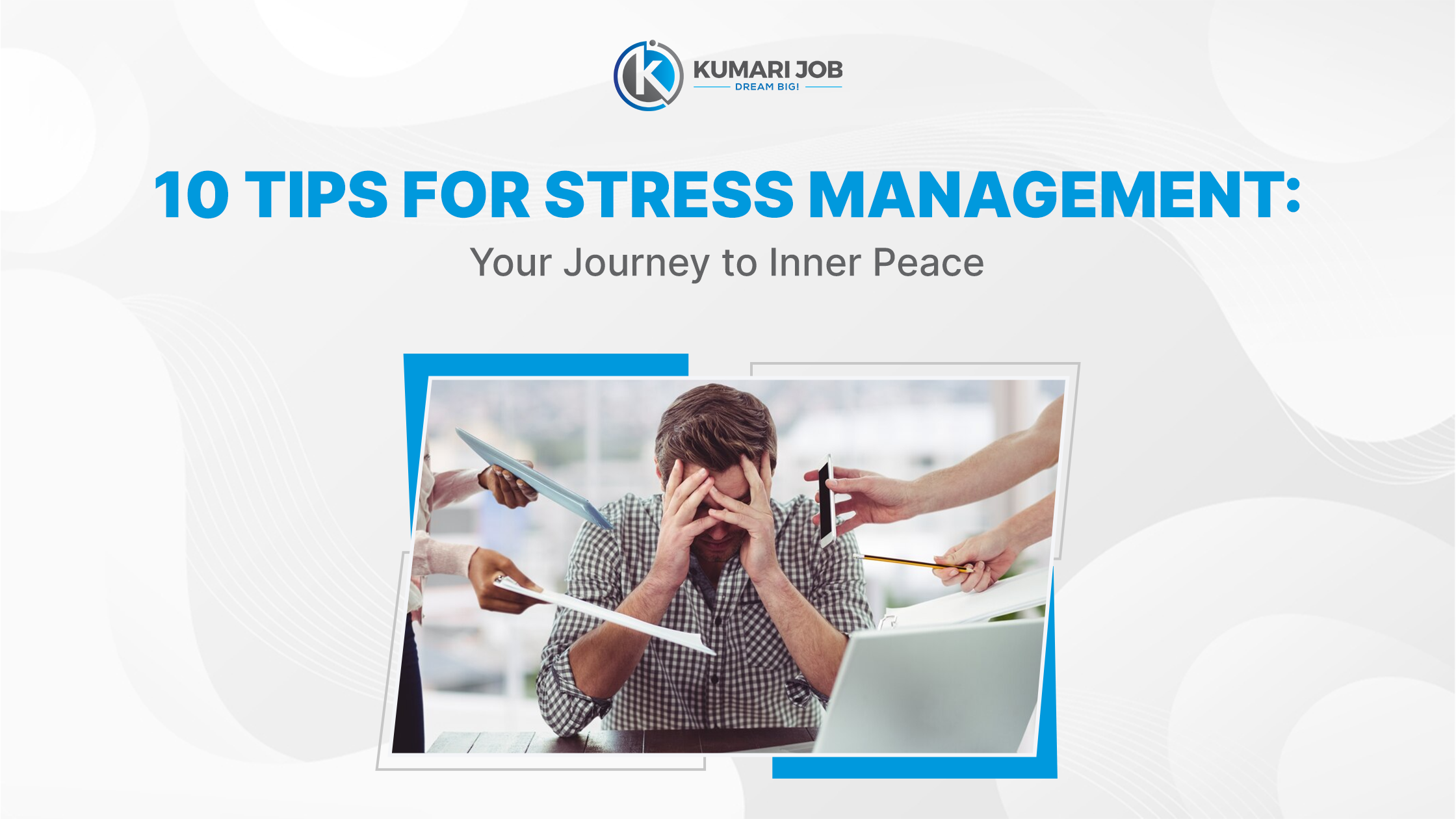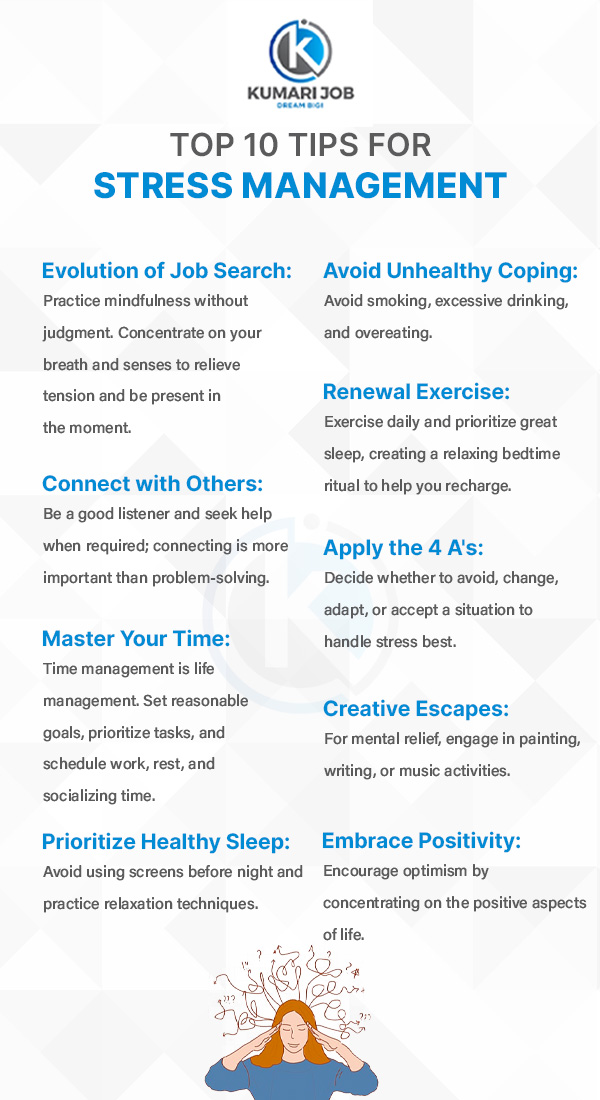
Introduction
‘The greatest weapon against stress is our ability to choose one thought over another.' - William James."
Ever get the feeling that the entire world is resting on your shoulders? This might be because of stress, a permanent companion characterized by anxiety or mental tension from a challenging circumstance. Stress is a normal human reaction that motivates us to deal with problems and dangers we cannot escape. What if we told you that it is not over yet? What if stress offers an opportunity as well as a burden?
According to Wikipedia, Stress management consists of a broad spectrum of techniques and psychotherapies aimed at controlling a person's stress level, especially chronic stress, usually to improve everyday functioning. Managing stress is not about eliminating it but understanding and navigating it effectively. In the fast-paced world of modern employment, stress has become a daily reality for many people. So, how can you deal with your stress in the real world and manage it to function effectively and enjoy your life? Are you ready to learn how to handle stress through a personalised stress management plan?
This blog will analyse the science of efficient stress management techniques and provide tips and tricks for living a more contented life that leads to enhanced productivity. We will explore why stress management is essential in personal and professional life and the possible stress solutions that empower individuals to succeed rather than survive amid contemporary challenges.
In this blog
Sources or Causes of Stress
Effective stress management begins with recognising the origins of stress in your life. However, this task is more complex than it may seem. Significant sources of stress like changing jobs, moving, or dealing with relationship shifts are easy to spot. However, figuring out why you are constantly stressed can be tricky. It is only sometimes obvious how your thoughts, feelings, and actions contribute to your daily stress levels. We frequently underestimate how our ideas, feelings, and behaviours impact how stressed we feel daily.
Deadlines, duties, and expectations can create pressure in the workplace that can impact a person's mental and physical health. Consider this: It is not the actual demands of your job that are causing you stress, but rather your habit of procrastination.
To get to the bottom of what is genuinely stressing you, closely examine your habits and mindsets and why you give up for not taking action.
Okay, let us simplify it:
- Because we are so busy, we sometimes believe our tension is only temporary. However, if we do not pause, it may be a warning that the stress will not disappear.
- Stress is a natural component of our work or personal lives. For instance, saying, "It is always crazy around here."
- Stress may also be perceived as a characteristic trait of the individual experiencing it, such as "I am just a high-energy person."
- Instead of blaming things or people around us for our stress, we should also realise we play a role.
We cannot manage stress if we deny our involvement in it. Like saying, "We need to accept some responsibility for our stress before we can fix it."
Understanding stress management
Stress management is essential to lead a fulfilled life in today's fast-paced society. We face many daily challenges, so having the tools necessary to overcome them is critical. There are many different ways to deal with stress and maintain our general well-being that are offered by stress management.
There are numerous stress management models, and each provides particular insights on how to manage stress properly. Much more research is needed to learn which tactics work in real-world situations. This continual investigation is crucial for improving and customizing stress management methods to meet individual requirements better.
According to Wikipedia, the following are some of the stress management models:
- The emergency response/fight-or-flight response by Walter Cannon (1914, 1932)
- General Adaptation Syndrome by Hans Selye (1936)
- Stress Model of Henry and Stephens (1977)
- Transactional (or cognitive) Stress Model/stress model of Lazarus after Lazarus (1974)
- Theory of resource conservation by Stevan Hobfoll (1988, 1998; Hobfoll & Buchwald, 2004)
Emergency Response/Fight-or-Flight Response (Walter Cannon, 1914, 1932)
Walter Cannon proposed that the body undergoes physiological changes in response to a perceived threat or stressor, known as the fight-or-flight response. This includes increased heart rate, heightened alertness, and the release of stress hormones like adrenaline. It prepares the body to either confront the threat or flee from it.
General Adaptation Syndrome (Hans Selye, 1936)
Hans Selye introduced the General Adaptation Syndrome (GAS) concept, which outlines the body's response to chronic stress. It consists of three stages: alarm (initial stress response), resistance (the body's attempt to cope with ongoing stress), and exhaustion (when resources are depleted, leading to potential health issues).
Stress Model of Henry and Stephens (1977)
The Henry and Stephens model emphasizes the interplay between personal characteristics, environmental factors, and situational appraisals in the experience of stress. It suggests that stress results from an individual's perception and interpretation of external stressors.
Transactional (or Cognitive) Stress Model (Lazarus, 1974)
Proposed by Richard Lazarus, this model emphasizes the role of cognitive appraisal in stress. How an individual perceives and evaluates a situation determines the level of stress experienced. This includes primary inspection (assessing the situation as threatening, challenging, or irrelevant) and secondary appraisal (evaluating one's resources to cope with the problem).
Theory of Resource Conservation (Stevan Hobfoll, 1988, 1998; Hobfoll & Buchwald, 2004)
Stevan Hobfoll's theory centres on individuals' striving to protect and conserve their physical, emotional, and social resources. Stress occurs when there is a perceived threat to these resources. Coping strategies are employed to manage and preserve these valuable assets.
These models offer various perspectives on how individuals respond to and cope with stress. Understanding these models can provide valuable insights into the complex nature of stress and inform effective stress management strategies.
Benefits of stress management
Stress management offers various advantages that improve our well-being and clear the path to success. As the renowned American author Wayne Dyer states,
"You cannot always control what goes on outside. However, you can always control what goes on inside."
This idea captures the essence of stress management and emphasizes its effectiveness in preserving inner balance in the face of external stressful events. Nelson Mandela is a shining example of a leader who demonstrated excellent stress management. Mandela experienced a challenging road that included years in prison, but he emerged not bitter but determined and kind.
Similarly, Abraham Lincoln showed incredible resiliency under the intense pressure of directing the country through the American Civil War. Lincoln overcame difficulties and solidified his reputation as one of history's most outstanding leaders by using strategic self-care and focusing on his vision for a United America.
These illustrations highlight the crucial role of efficient stress management in accomplishing extraordinary things and provide insights on dealing with emotional stress, highlighting its importance in life's personal and professional sectors.
Examples of stress management
Why stress management is important becomes evident when we examine the career of Oprah Winfrey, a globally renowned media mogul, who has exemplified exceptional stress management throughout her illustrious journey. Despite facing immense pressure and demanding schedules, Oprah maintains a well-balanced lifestyle.
- Oprah recognises the importance of self-care for maintaining physical and mental well-being.
- She incorporates regular exercise routines and a balanced diet to stay physically and mentally fit.
- Oprah is dedicated to mindfulness and meditation practices, which help her cultivate a calm and focused mindset.
- Oprah emphasizes the need for clear boundaries between work and personal life, ensuring she dedicates time to her well-being and relaxation.
- She openly communicates her needs and priorities to ensure her well-being is a central focus.
- Oprah effectively delegates tasks as necessary, recognizing that she does not have to do everything alone to succeed.
Oprah Winfrey demonstrates how stress management activities can lead to long-term success and well-being by prioritising self-care, establishing boundaries, and maintaining open lines of communication.
Top 10 Tips for Stress Management
- Mindful Moments: Practice Mindfulness Everyday: Mindfulness involves being fully present in the current moment, paying attention to your thoughts, feelings, and surroundings without judgment. It helps reduce stress, improve focus, and enhance overall well-being.
Steps to Practice Mindfulness Every Day
- Dedicate a few minutes daily for mindfulness, like in the morning or before bedtime.
- Find a peaceful, distraction-free place to sit or stand.
- Close your eyes, take deep breaths, and feel your chest and abdomen rise and fall.
- Let thoughts come and go without control; observe.
- Notice what you see, hear, feel, and smell.
- Avoid judging thoughts or feelings as good or bad; accept them.
- If your mind drifts, gently bring your attention to your breath or senses.
- Practice mindfulness during everyday tasks like eating or walking.
Keep in mind that mindfulness is a skill that gets improved with practice. You are likely to get more significant benefits from it the more frequently you engage in it.
2. Stop using unhealthy stress management techniques: When we are stressed, we sometimes fall back on routines that are short-term solutions. They may provide momentary relief but ultimately do more harm than good: - Smoking, excessive drinking, or considering taking drugs.
- Consuming a lot of comfort food or unhealthy food.
- Losing focus for hours while staring at the TV or phone.
- Staying away from friends, family, and social gatherings.
- Oversleeping.
- Constantly being engaged in something to avoid dealing with problems.
- Postponing tasks.
- Focussing your frustration on other people by becoming angry or even violent.
It is time to develop healthy coping mechanisms that leave you calm and in control of how you handle stress without improving your feelings.
2. Physical Renewal: Using Exercise to Reduce Stress
Physical renewal means using exercise to improve mood and reduce stress. Regular physical activity releases endorphins, organic brain chemicals; these function as organic mood enhancers and painkillers. You can reduce anxiety, sadness, and tension by following a routine and working towards physical renewal. Therefore, consistently exercising can lessen these uncomfortable feelings and enhance your general well-being.
3. Get quality sleep, prioritizing good sleep
Ensure you receive adequate, rejuvenating sleep every night. Establish a relaxing bedtime practice, maintain a pleasant sleeping environment, and avoid using devices just before bed. Your body and mind are refreshed by quality sleep, which enables you to handle stress during the day better.
Guidelines for Healthy Sleep Hygiene
- Keep a regular schedule by keeping your sleep and wake hours the same.
- A cosy sleeping environment should be ensured, including a comfy bed.
- Avoid using electronic devices right before bed.
- Establish a relaxing routine and do it before bed.
- Limit caffeine and nicotine, particularly before bed.
- Moderate Meals and Alcohol.
- Regular exercise is advised, but avoid intense exercise right before night.
- Practice stress-relieving exercises like meditation or deep breathing.
- Keep daytime naps to 20 to 30 minutes.
- If sleep issues continue, get professional assistance.
4. Making connections with peopleConnecting with others is a potent stress reliever. Face-to-face interactions trigger calming hormones, countering stress responses. Regular face-to-face interaction with loved ones and friends is crucial for maintaining mental health and preventing depression and anxiety. Having a good listener is more helpful than having someone answer your problems. Do not be afraid to open up, as trust strengthens the bond.
Tips to make connections
- Make a connection with a coworker.
- Give back by helping others through volunteering.
- Share a meal or coffee with a friend.
- Ask a loved one to check in with you often.
- Take a date to a movie or concert.
- Enjoy a walk with a fellow exerciser.
- Set up a regular dinner date.
- Increase your social network by joining clubs or classes.
- Consult a mentor, teacher, or sports coach for guidance and confide in them.
Strong connections are a powerful antidote to stress and loneliness, providing depth to life.
- Time Mastery: Managing Your Time to Balance Your Responsibilities
Time management is not about adding extra hours to your day but maximising your hours. Since time and stress management go hand in hand, allow time in your daily plan for work, rest, hobbies, and socialising. Set realistic goals, prioritise tasks by importance, and divide larger projects into manageable chunks. By managing your time well, you may do more while feeling less stressed. How you handle stress is intricately linked to how effectively you manage your time. Therefore, H. Jackson Brown Jr. states,
“Time management is life management."
Visit our blog for further professional advice and in-depth insights on efficient time management. Explore a range of tools created to help you increase productivity and make the most of your limited time. Explore now by clicking here ("10 Proven Time Management Skills: The Key to Efficient Days")
- Apply the 4 A's of stress management.
Your nervous system is responsible for the natural stress response. The daily commute or meetings are two familiar sources of stress. You have two options for dealing with these: altering the circumstance or responding.
Consider the four A's before choosing: avoid, alter, adapt, or accept.
2. Avoid Unnecessary Stress
- Learn to say "no" when your schedule is already too busy. Stress results from taking on too much. According to Forbes, One of the most valuable lessons you can learn is when to say “yes” or “no” in your career and life.
- Spend less time with those that consistently make you anxious. Create distance if necessary.
- Take control of your surroundings. Find a solution or alter the situation if anything is upsetting you.
3. Alter the Situation
- Instead of suppressing your emotions, express them openly to others. As a result, jealousy does not develop.
- Embrace compromise. Finding common ground in partnerships requires flexibility.
- Address problems directly with confidence. Stress is decreased by taking command of your own life.
4. Adapt the stressor
- Problems should be changed from a constructive angle. Consider difficulties as chances for development.
- Put stressful circumstances in perspective. Consider whether it will be significant in the long run.
- Set new standards. Aim for excellence rather than perfection. Get used to "good enough."
. Accept what cannot be changed.
- Do not attempt to control anything, primarily other people's actions. Concentrate on your responses.
- Find the positive aspects of difficult situations. They may result in learning and personal development.
- Make an effort to forgive. For your mental health, let go of past mistakes.
Creative Escape: Taking Part in Relaxing Activities: Research on stress management has found much support for taking creative breaks through comforting hobbies. A 2016 Journal of Positive Psychology study found that those who regularly engage in creative activities experience less stress and greater overall well-being. A well-known artist, Pablo Picasso, famously remarked,
"Art washes away from the soul the dust of everyday life,"
Highlighting the significant influence of artistic expression on our mental and emotional health. This sentiment emphasises the transformative power of engaging in activities like painting, writing, and performing music to find comfort and renewal amidst life's obligations.
Individuals frequently turn to creative escapes to address their need for stress management. Such activities provide an environment of peace and serve as an essential reminder of the fundamental connection between creativity and efficient stress management.
Positive Attitude: Shifting Perspectives for Optimism
Research supports the significant impact of a positive attitude on stress management. A 2019 Journal of Psychosomatic Research study found that people with a positive outlook have lower cortisol levels and suffer from fewer stress-related health problems. Research demonstrates the natural health advantages of practising optimism as a stress-reduction strategy.
As for a famous saying, I remember Helen Keller's advice:
"Keep your face toward the sunshine, and shadows will fall behind you."
This remarkable statement by the legendary Helen Keller highlights the ability of an optimistic outlook to overcome obstacles in life. It serves as a reminder that by concentrating on positive aspects in any circumstance, we may effectively manage stress and proceed with resiliency and positivity.
- Professional Assistance: Recognizing When to Seek Professional Advice: Research supports the effectiveness of consulting a professional for stress management. An extensive study published in the Journal of Clinical Psychology (2018) found that people who received therapy or counselling noticed significant reductions in stress levels and improved overall mental health outcomes. The result demonstrates the advantages of obtaining expert advice for efficient stress management.
In the words of the renowned American author and activist Audre Lorde:
"Caring for myself is not self-indulgence; it is self-preservation, which is an act of political warfare."
The above quote emphasises the significance of knowing when to seek professional help, stressing that taking care of one's mental and emotional well-being is not just a personal obligation but also an effective tool for overcoming obstacles in life. It serves as a reminder that asking for help is a crucial component of self-preservation and, in the end, results in a more balanced and resilient life.
In short, effective stress management involves practising mindfulness, seeking professional help when needed, maintaining a positive attitude, and making meaningful connections. Prioritising self-care and healthy coping mechanisms are critical to a balanced and resilient life.
Remember, seeking professional guidance is a sign of strength, not weakness. Keep moving forward with a positive outlook and proactive strategies for a healthier, more fulfilling life.
Conclusion
In today's fast-paced world, stress has become pervasive. However, it is crucial to see it not just as a burden but also as a chance for personal growth. The key lies in effective stress management, enabling us to face life's challenges with resilience. Stress management starts with recognising the sources, often rooted in our habits and thought patterns. By accepting responsibility for our stress part, we open the door to solutions. The benefits extend beyond personal well-being; it has been pivotal in the remarkable achievements of figures like Nelson Mandela and Abraham Lincoln, highlighting stress's transformative potential. Oprah Winfrey's career serves as a tangible example—practices like self-care, setting boundaries, and effective communication balance a demanding schedule. Embracing a positive attitude and seeking professional help are further crucial facets. Ultimately, in a world of constant demands, effective stress management empowers us to survive and thrive, taking charge of our inner world for a more fulfilling and contented life. Remember, our ability to choose our thoughts is the ultimate weapon against stress.
“Stress is not what happens to us. It is our response to what happens, and response is something we can choose.” - Tiny Buddha.
Read more related articles: https://kumarijob.com/careertip.
Frequently Asked Questions
Although stress is an inevitable aspect of life, it can be considerably minimized with wise management.
Since it impacts everyone, the benefits of effective stress management extend to people from all areas of life.
Absolutely. Many methods can be easily modified and are acceptable for even the busiest schedules.
Yes, consistent practice of stress management techniques requires regular practice.
Certainly, focus, creativity, and general productivity are all improved when stress levels are lower.
Stress management is crucial because it may be detrimental to both mental and physical health. To live a happier, more balanced life and improve your overall well-being stress management is necessary.

.png)







Loading Comments...